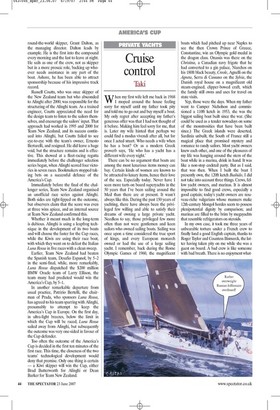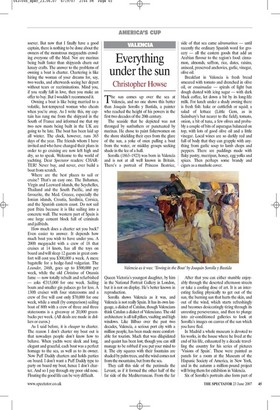Cruise control
Taki When my first wife left me back in 1968 I moped around the house feeling sorry for myself until my father took pity and told me to go out and buy myself a boat. My only regret after accepting my father's generous offer was that I had not thought of it before. Making him feel sorry for me, that is. Later my wife hinted that perhaps we could find a modus vivendi after all, but for once I acted smart. Who needs a wife when he has a boat? Or as a modern Greek proverb says, 'He who has a yacht has a different wife every night.'
There can be no argument that boats are among the most luxurious items money can buy. Certain kinds of women are known to be attracted to luxury items, hence their love of the sea. Especially today. Never have I seen more tarts on board superyachts in the 50 years that I've been sailing around the Med than there are at present. It wasn't always like this. During the past 150 years of yachting, there have always been the privileged few willing and able to satisfy their dreams of owning a large private yacht. Needless to say, those privileged few more often than not were gentlemen and keen sailors who owned sailing boats. Sailing was once upon a time considered the true sport of kings, and every European monarch owned or had the use of a large sailing yacht. I remember, back during the Rome Olympic Games of 1960, the magnificent boats which had pitched up near Naples to see the then Crown Prince of Greece, Constantine, win an Olympic gold medal in the dragon class. Onassis was there on the Christina, a Canadian navy frigate that he had converted to a gin palace, Niarchos on his 180ft black beauty, Creole, Agnelli on the Agneta, Serra di Cassano on the Sylvia, the Danish royal house on a magnificent old steam-engined, clipper-bowed craft, which the family still owns and uses for travel on state visits.
Yep, those were the days. When my father went to Camper Nicholson and commissioned a 110ft ketch in 1953, she was the biggest sailing boat built since the war. (She could be used as a tender nowadays on some of the monstrosities that have been built since.) The Greek islands were deserted, Sardinia unbuilt, the South of France still a magical place that promised mystery and romance to randy sailors. Most yacht owners knew each other, and one of the pleasures of my life was hanging around the stem of the boat while in a marina, drink in hand. It was like a non-stop cocktail party. But as I said, that was then. When I built the boat I presently own, the 120ft ketch Bushido, I did not take into account three things. Crews, fellow yacht owners, and marinas. It is almost impossible to find good crews, especially a good captain; today's yacht owners are nouveau-riche vulgarians whose manners make 12th-century Mongol hordes seem to possess plenipotential dignity by comparison; and marinas are filled to the brim by megayachts that resemble refrigerators on steroids.
In my own case, it took me three years of unbearable torture under a French crew to finally land a good English captain, thanks to Roger Taylor and Countess Bismarck, the latter having taken pity on me while she was a guest on board. A bad crew is like someone with bad breath. There is no enjoyment whatsoever. But now that I finally have a good captain, there is nothing to be done about the owners of the monstrous megayachts crowding everyone off the Med. Nor are marinas being built faster than shipyards churn out luxury crafts. The answer to the problems of owning a boat is charter. Chartering is like hiring the woman of your dreams for, say, two weeks, and afterwards seeing her depart without tears or recriminations. Mind you, if you really fall in love, then you make an offer to buy. But I wouldn't recommend it.
Owning a boat is like being married to a volatile, hot-tempered woman who cheats when you're away. As I write this, my captain has rung me from the shipyard in the South of France and informed me that my two new masts being built in the UK are going to be late. The boat has been laid up all winter. The clock, however, runs 365 days of the year. The friends whom I have invited and who have changed their plans in order to go cruising are now left high and dry, so to speak. Welcome to the world of yachting. Dear Spectator readers: CHARTER! Never buy, and never, ever build a boat from scratch.
Where are the best places to sail or cruise? That's an easy one. The Bahamas, Virgin and Leeward islands, the Seychelles, Thailand and the South Pacific, and my favourite, the Med. Greece, especially the Ionian islands, Croatia, Sardinia, Corsica, and the Spanish eastern coast. Do not sail past Ibiza because it is like sailing into a concrete wall. The western part of Spain is one large cement block full of criminals and jailbirds.
How much does a charter set you back? Even easier to answer. It depends how much boat you wish to have under you. A 200ft megayacht with a crew of 18 that cruises at 14 knots, has all the toys on board and will sleep 12 guests in great comfort will cost you $300,000 a week. A mere bagatelle for a hedge-fund vulgarian. The Leander, 246ft, goes up to $500,000 per week, while the old Christina of Onassis fame — now totally rebuilt and refurbished — asks €315,000 for one week. Sailing boats and smaller gin palaces go for less. A 130ft cruiser with four staterooms and a crew of five will cost only $70,000 for one week, while a small (by comparison) sailing boat of 80ft with a crew of three and three staterooms is a giveaway at 20,000 greenbacks per week. (All deals are made in dollars or euros.) As I said before, it is cheaper to charter. The reason I don't charter my boat out is that nowadays people don't know how to behave. When yachts were sleek and long, elegant and graceful, each boat was a perfect homage to the sea, as well as to its owner. Now Puff Daddy charters and holds parties on board. I don't want a Puff Daddy type to party on board my boat, hence I don't charter. And so I pay through my poor old nose. Floating the good life can be very difficult.






























































 Previous page
Previous page